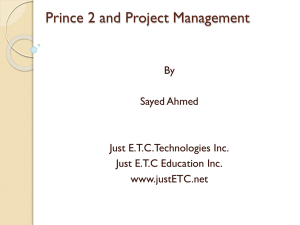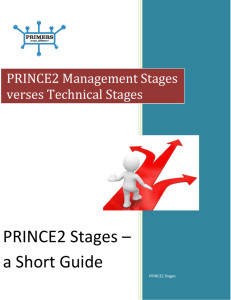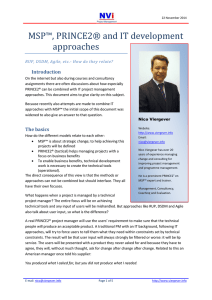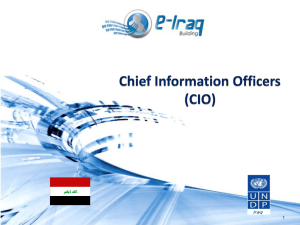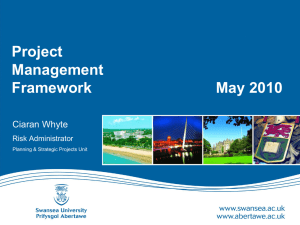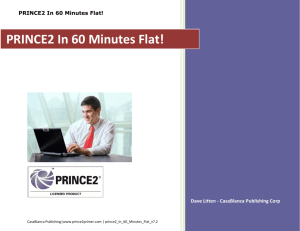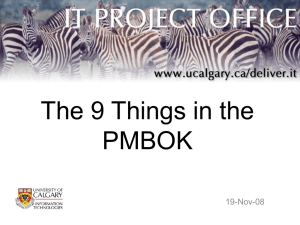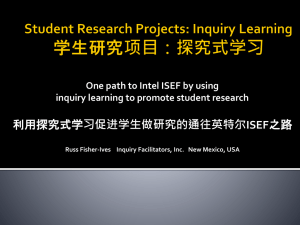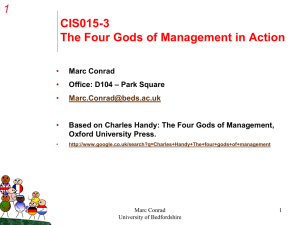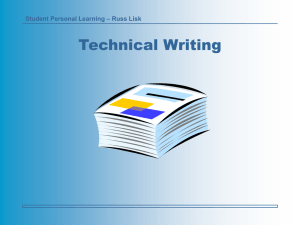PPTX - PMI Baltimore Chapter
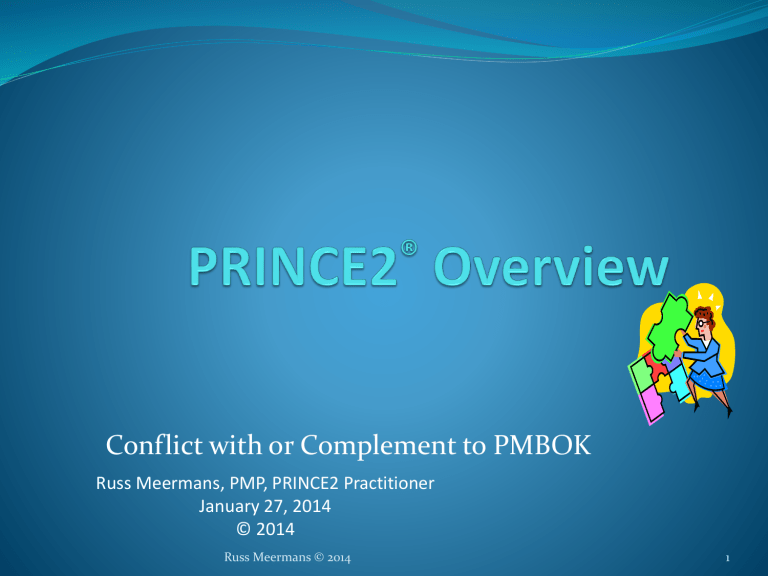
Conflict with or Complement to PMBOK
Russ Meermans, PMP, PRINCE2 Practitioner
January 27, 2014
© 2014
Russ Meermans © 2014 1
Agenda
• What is PMBOK Guide / What is PRINCE2 ®
• Characteristics of PRINCE2 ®
• Quick Comparison, PMBOK ® – PRINCE2 ®
Russ Meermans © 2014 2
What is PMBOK
®
Guide ?
PMBOK ® Guide identifies that subset of the project management body of knowledge generally recognized as good practices
PMBOK ® Guide provides and promotes a common vocabulary within the project management profession for discussing, writing, and applying project management concepts
PMBOK ® Guide establishes guidelines for project management processes, tools, and techniques
Russ Meermans © 2014 3
What Is PRINCE2
®
?
Projects in a Controlled Environment (PRINCE)
PRINCE2 ® is a book that describes a method for approaching managing and closing down a project of any type or size
PRINCE2 ® tells what should be done and why it should be done but does not say how it should be done
PRINCE2 ® is not prescriptive, rather it is descriptive
PRINCE2 ® is a structured management method
®U.K.’s Office of Government Commerce (OGC)
Russ Meermans © 2014 4
PMBOK
®
Flow
Inputs
Tools &
Techniques
PM Outputs
Russ Meermans © 2014 5
PRINCE2
®
Flow
Work Product
Outputs
Outcomes
Business
Benefits
Russ Meermans © 2014 6
Five Main Aspects to PRINCE2
®
In order to successfully complete any significant job of work there are five main aspects that need to be considered, namely:
• The method to be used, in other words how will you approach the job
• How will the work be organized
• What are the main factors that need to be taken into account
• Who will have responsibility for what
• And how will progress be monitored and communicated
Russ Meermans © 2014 7
PRINCE2
®
Project Variables
Timescale
Cost
Quality
Risk Benefits Scope
Russ Meermans © 2014 8
PRINCE2 ® Project Characteristics
Change Uncertainty
Unique Temporary
Crossfunctional
Russ Meermans © 2014 9
PRINCE2
®
– 7X7X7
Seven Principles
The seven Principles provide a best-practice framework for the project. Ultimately they define a PRINCE2 ® project
Seven Themes
The seven Themes provide guidance on aspects of project work which should be addressed at various points during the undertaking. They relate to each other and are integrated into the Processes
Seven Processes
The seven Processes offer a ‘journey’ through the project so that critical aspects of project work are neither forgotten nor treated in a trivial manner
Russ Meermans © 2014 10
PRINCE2
®
Principles
Continued business justification (Benefits)
Learn from experience
Defined roles and responsibilities
Managed by stages
Managed by exception (appropriate delegation of authority)
Focus on products
Tailor to suit the project environment
Russ Meermans © 2014 11
PRINCE2
®
Processes
Starting up a project
Directing a project
Initiating a project
Controlling a stage
Managing product delivery
Managing a stage boundary
Closing a project
PRINCE2® processes are management processes
Russ Meermans © 2014 12
PRINCE2 ® Structure
Directing
Managing
Preproject
Initiation stage
Subsequent delivery stages
Directing a project
Delivering
IP
SB
Controlling a stage
SB
Managing product delivery
Key
SU = Starting up a project
IP = Initiating a project
SB = Managing a stage boundary
CP = Closing a project
Russ Meermans © 2014
Final delivery stage
CP
Controlling a stage
Managing product delivery
13
Project Board
Project
Executive
Senior
Project
User
Project
Board
Senior
Project
Supplier
Project
Manager
Russ Meermans © 2014 14
PRINCE2
®
Authority
Corporate or Program
Project Board – Project Executive
Project Manager
Team Manager(s)
Tolerances
Project
Management Stage
Work Package
Set By
Corporate/Program
Project Board
Project Manager
Russ Meermans © 2014 15
PRINCE2
®
PRE-PROJECT FLOW
Project
Mandate
Appoint
Project
Executive
Draft Outline
Business Case
A
Appoint
Project
Manager
• Capture Previous Lessons
• Select Project Approach
• Create Project Product Description (High Level)
• Design/Appoint Project Management Team
• Prepare Project Brief
• Prepare Initiation Stage Plan
Create Daily
Log
Request
Approval to
Start Initiation
Stage
A
Russ Meermans © 2014 16
PRINCE2
®
Stages
Must be at least two management stages:
Initiation + Execution
Do not necessarily align to technical phases
Russ Meermans © 2014 17
PRINCE2
®
BENEFITS
Mandate – Very High Level
Outline Business Case– High Level
User Defined - Specific
Business Case - Detailed
Benefits Review – Verify (usually post-project)
Any time it is recognized that benefits will not be achieved the Project Board looses authority to continue.
Russ Meermans © 2014 18
PRINCE2
®
Themes
Business Case
Organization
Quality
Plan
Risk
Change
Progress
Russ Meermans © 2014 19
PRINCE2
®
Themes
Business Case The Business Case for a project forms part of its very foundation. It is the most important
Organization set of information for a project and drives the decision-making process. It is used
Quality continually to ensure that the project’s progress is aligned with the business Plan objectives.
Risk
Change
Progress
Answers the questions; Is the project:
• Desirable (cost/benefit/risk balance)
• Viable (project can deliver the products)
• Achievable (can products provide the benefits)
Is the responsibility of the Project Executive
Some aspects may be assigned to the Project Manager
Russ Meermans © 2014 20
PRINCE2 ® Themes
Business Case
Organization
Defining all the roles, responsibilities and relationships for the people involved in managing and executing the project . Quality
Plan
Risk
Change
Progress
User
Customer
(Business Interest)
Russ Meermans © 2014
Supplier
21
PRINCE2
®
Themes
Business Case
Organization
Quality
Plan
Risk
The emphasis which PRINCE2 ® places on products, or deliverables, means that it is easy to see the relevance of traditional quality management principles to the management of projects.
Change
Progress
Four elements of Quality:
• Quality System
• Quality Planning
• Quality Assurance
• Quality Control
Russ Meermans © 2014 22
PRINCE2
®
Themes
Quality
Responsibility of the Project Board
Three views: Executive – User – Supplier
Project Manager has NO Quality Execution Responsibilities
(except for the Quality Plan)
Russ Meermans © 2014 23
PRINCE2 ® Themes
Business Case
Organization
Quality
Plans
Risk
Change
Progress
Product-based Planning
These are the backbone of the management information system that is required for any project. PRINCE2 ® is very concerned with the different levels of plan which need to be produced and the approvals which are required before plans are put into action.
Three levels of plans:
• Project
• Stage
• Team (optional)
• Exception
Russ Meermans © 2014 24
PRINCE2 ® Themes
Business Case
Organization
Quality
Plan
Risk
Change
Progress
Since risk is such a fundamental consideration within the Business Case,
PRINCE2 ® identifies Risk as a Theme in its own right to assess and take relevant action in respect of uncertainties.
Russ Meermans © 2014 25
PRINCE2
®
Themes
Risk Responses
Threat Response
Share
Avoid
Reduce
Fallback
Transfer
Accept
Opportunity
Response
Share
Exploit
Enhance
Reject
Russ Meermans © 2014 26
PRINCE2 ® Themes
Business Case
Organization
Quality
Plan
Risk
Change
Progress
Change in projects is inevitable so
PRINCE2 ® defines procedures for managing changes as they occur or become necessary. This can be a particularly crucial element in a project since the rest of the project or other projects or perhaps a program can be affected by changes made within a project. This Theme also provides for
Configuration Management which may be thought of as asset control.
A common approach to Issue and Change Control
• Request for change
• Off-specification (non-conformance)
• Problem/concern (issue)
Russ Meermans © 2014 27
PRINCE2® Themes
Business Case
Organization
Quality
Plan
Risk
Change
Progress
As important as it is to plan the project it is equally important to know how the project is progressing. When the ‘actual state’ is known and compared to the planned state, then control is possible.
Russ Meermans © 2014 28
PRINCE2
® v
PMBOK
®
Guide
A method
Descriptive
What and Why
Principals & Processes
Does not address tools & techniques
Defined roles
Managed by exception
Not a methodology
Prescriptive
How and Why
Processes
Guidelines for tools & techniques
Russ Meermans © 2014 29
PRINCE2
® v
PMBOK
®
Guide
PRINCE2
® requires an organization change
PMBOK
® can be applied in virtually any organization
PRINCE2
® is based on shared responsibilities
PMBOK
® places the responsibilities on the project manager
Russ Meermans © 2014 30
Some Definitions
PRINCE2
Project: A project is a temporary organization that is created for the purpose of delivering one or more business products according to an agreed Business Case.
PMBOK
Project: A temporary endeavor undertaken to create a unique product, service, or result.
Russ Meermans © 2014 31
Some Definitions
PRINCE2
Project Management: The planning, delegating, monitoring and control of all aspects of the project, and the motivation of those involved, to achieve the project objectives within the expected performance targets of time, cost, quality, scope, benefits and risks.
PMBOK
Project Management: The application of knowledge, skills, tools, and techniques to project activities to meet the project requirements.
Russ Meermans © 2014 32
Conflict or Complementary
Bottom Line –
PRINCE2 and PMBOK Edition 5 are Complementary
Russ Meermans © 2014 33
